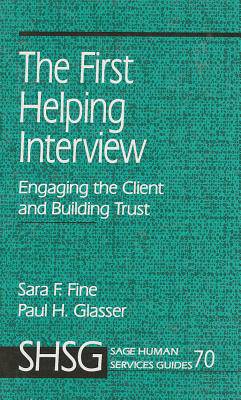
Bedankt voor het vertrouwen het afgelopen jaar! Om jou te bedanken bieden we GRATIS verzending (in België) aan op alles gedurende de hele maand januari.
- Afhalen na 1 uur in een winkel met voorraad
- In januari gratis thuislevering in België
- Ruim aanbod met 7 miljoen producten
Bedankt voor het vertrouwen het afgelopen jaar! Om jou te bedanken bieden we GRATIS verzending (in België) aan op alles gedurende de hele maand januari.
- Afhalen na 1 uur in een winkel met voorraad
- In januari gratis thuislevering in België
- Ruim aanbod met 7 miljoen producten
Zoeken
€ 331,45
+ 662 punten
Uitvoering
Omschrijving
Providing a practical handbook for practitioners in the helping professions, The First Helping Interview is a highly useful, easy-to-understand guide for both experienced and novice practitioners that reveals the steps involved in the crucial first meeting with a client. The authors approach the task of an initial interview by providing an overview of what the therapeutic process is and what to expect from clients, both those who seek help voluntarily and those who are required to get help. The book also covers the practical basics of therapy--counselor/client roles, physical settings, communication dynamics, assessment and diagnosis, record keeping, goals and contracts, and trust building. Separate chapters discuss special topics such as working with couples and families, the role of culture and ethnicity, when and how to refer clients with serious problems, and legal and ethical issues. Although this book is general enough to be used by any practitioner, the authors pay particular attention to specific settings, such as child protective services, crisis intervention, and corrections. Social workers, marriage and family therapists, school counselors, psychiatric nurses, child welfare workers, and probation officers will appreciate this valuable, indispensable reference tool.
Specificaties
Betrokkenen
- Auteur(s):
- Uitgeverij:
Inhoud
- Aantal bladzijden:
- 205
- Taal:
- Engels
- Reeks:
- Reeksnummer:
- nr. 70
Eigenschappen
- Productcode (EAN):
- 9780803971400
- Verschijningsdatum:
- 1/07/1996
- Uitvoering:
- Hardcover
- Formaat:
- Genaaid
- Afmetingen:
- 145 mm x 216 mm
- Gewicht:
- 385 g

Alleen bij Standaard Boekhandel
+ 662 punten op je klantenkaart van Standaard Boekhandel
Beoordelingen
We publiceren alleen reviews die voldoen aan de voorwaarden voor reviews. Bekijk onze voorwaarden voor reviews.









